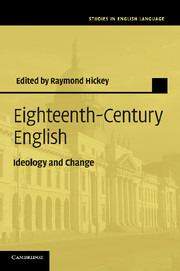Book contents
- Frontmatter
- Contents
- List of figures
- List of maps
- List of tables
- Notes on contributors
- Preface
- 1 Attitudes and concerns in eighteenth-century English
- 2 Prescriptivism and the suppression of variation
- 3 Women's grammars
- 4 Eighteenth-century women and their norms of correctness
- 5 Lowth as an icon of prescriptivism
- 6 Queeney Thrale and the teaching of English grammar
- 7 Coalitions, networks, and discourse communities in Augustan England: The Spectator and the early eighteenth-century essay
- 8 Contextualising eighteenth-century politeness: social distinction and metaphorical levelling
- 9 Expressive speech acts and politeness in eighteenth-century English
- 10 Variation and change in eighteenth-century English
- 11 Variation in sentential complements in eighteenth- and nineteenth-century English: a processing-based explanation
- 12 Nationality and standardisation in eighteenth-century Scotland
- 13 English in eighteenth-century Ireland
- 14 Changes and continuities in dialect grammar
- 15 ‘Be pleased to report expressly’: the development of a public style in Late Modern English business and official correspondence
- 16 Registering the language – dictionaries, diction and the art of elocution
- Timeline for the eighteenth century
- References
- Late modern English language studies
- Indexes
8 - Contextualising eighteenth-century politeness: social distinction and metaphorical levelling
Published online by Cambridge University Press: 06 December 2010
- Frontmatter
- Contents
- List of figures
- List of maps
- List of tables
- Notes on contributors
- Preface
- 1 Attitudes and concerns in eighteenth-century English
- 2 Prescriptivism and the suppression of variation
- 3 Women's grammars
- 4 Eighteenth-century women and their norms of correctness
- 5 Lowth as an icon of prescriptivism
- 6 Queeney Thrale and the teaching of English grammar
- 7 Coalitions, networks, and discourse communities in Augustan England: The Spectator and the early eighteenth-century essay
- 8 Contextualising eighteenth-century politeness: social distinction and metaphorical levelling
- 9 Expressive speech acts and politeness in eighteenth-century English
- 10 Variation and change in eighteenth-century English
- 11 Variation in sentential complements in eighteenth- and nineteenth-century English: a processing-based explanation
- 12 Nationality and standardisation in eighteenth-century Scotland
- 13 English in eighteenth-century Ireland
- 14 Changes and continuities in dialect grammar
- 15 ‘Be pleased to report expressly’: the development of a public style in Late Modern English business and official correspondence
- 16 Registering the language – dictionaries, diction and the art of elocution
- Timeline for the eighteenth century
- References
- Late modern English language studies
- Indexes
Summary
For when to civil things, civil things are added, the whole will be civil. Q.E.D.
(1773 Thomas Twining I, 85)Introduction
Politeness was a buzzword in eighteenth-century England. In A Tale of a Tub (1704), Jonathan Swift refers to ‘this Polite and Learned Age’, and in the Spectator (1711), Joseph Addison talks about ‘all the polite Nations of the World’. The concept of politeness also occupies a prominent place in eighteenth-century scholarship. Paul Langford includes it in the title of his best-selling book A polite and commercial people: England, 1727–1783(1989). The pursuit of politeness became a major concern for these commercial people, as Susan Fitzmaurice (1998) shows in her study of the emergence of ‘polite English’ in the eighteenth century. Politeness was not only considered to be an ideal of behaviour, but was also displayed in a material context. Lawrence Klein (2002: 870) sums up the ramifications of the concept of politeness by noting that it is used to interpret ‘material and visual cultures, the organisation of space, the constitution of social and political identities, the character of intellectual and artistic life, and even institutional structures’.
Our study approaches eighteenth-century politeness from the perspective of keywords, their socio-cultural embedding and the cognitive metaphors they embody. For this purpose we have selected three sets of ‘polite’ words, which we will study using a corpus of eighteenth-century correspondence.
- Type
- Chapter
- Information
- Eighteenth-Century EnglishIdeology and Change, pp. 133 - 158Publisher: Cambridge University PressPrint publication year: 2010
- 12
- Cited by

